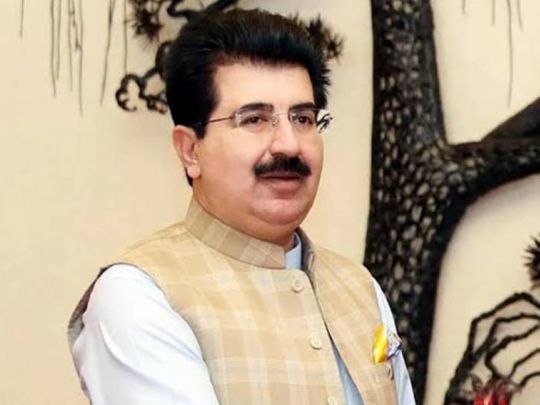
Islamabad: In a significant setback to the combined opposition parties, the ruling coalition’s candidate Sadiq Sanjrani won another term as the Senate chairman on Friday.
Sadiq Sanjrani defeating the joint opposition Pakistan Democratic Movement’s (PDM) candidate Yousaf Raza Gilani by securing 48 votes. Pakistan Peoples Party (PPP) leader Gilani and opposition candidate Gilani received 42 votes. The presiding officer found at least eight ballot papers invalid.
The victory for the ruling party Pakistan Tehreek-e-Insaf (PTI) has strengthened the government’s position in the upper house of the parliament following a recent setback in the Senate polls.
After winning the election and taking oath, Sanjrani thanked Prime Minister Imran Khan and members of the ruling coalition for reposing confidence in him. Sanjrani later presided over the election of the Senate’s deputy chairman. Polling for the offices of Senate chairman and deputy chairman was held on Friday afternoon in Islamabad after the 48 newly elected Senators took the oath of office. The result was announced after the voting through a secret ballot ended at 5pm.
The ruling party PTI candidates were Sadiq Sanjrani and Mirza Muhammad Afridi for the slots of Senate chairman and deputy chairman respectively. The opposition fielded former prime minister Yousaf Raza Gilani and Maulana Abdul Ghafoor Haideri of Jamiat Ulema-e-Islam (JUI-F) as their joint candidates for the posts of chairman and deputy chairman.
Close contest
The crucial election for the two top offices of the upper house of the parliament was held in a tensed atmosphere and Gilani was described as a strong candidate by the analysts as the opposition enjoys a clear majority in Senate after March 2021 polls.
The ruling coalition has the strength of 47 members in the House including 27 members of PTI, 12 of Balochistan Awami Party (BAP), three MQM and three independent members and one each of PML-Q and GDA.
Meanwhile, the opposition senators include 21 from PPP, 17 from Pakistan Muslim League-Nawaz’s (PML-N), five of JUI-F, two each of ANP, BNP, PkMAP and National Party. The one Jamaat-i-Islami senator decided to abstain from voting.
Spy cameras controversy
The Senate session was briefly interrupted after opposition senators, PPP’s Mustafa Nawaz Khokhar and PML-N’s Musadik Malik, claimed to have found alleged ‘spy cameras’ near the polling booth and shared photos on Twitter. The presiding officer Syed Muzaffar Hussain Shah directed a body consisting of three members each from the government and the opposition to investigate the claim.
Senators are elected by the members of the country’s provincial and national assemblies. Each senator serves a term of six years but 50 per cent of the total number retire after every three years.
The recent elections were held for 48 seats. Pakistan’s Senate now comprises of 100 lawmakers of whom 98 took part in Friday’s election as PML-N’s Ishaq Dar is in self-exile and one Senator did not participate in voting.
Profile of Sanjrani
Muhammad Sadiq Sanjrani, who was re-elected as Senate chairman, became the youngest Senator to hold the position in 2018.
Sanjrani hails from Pakistan’s less-developed Balochistan province and has a master’s degree in International Relations.
He is described as a person with an “impeccable knowledge of finance, economy, trade, commerce and industry, as well as geo-political and international affairs”. His profile includes experience of public sector administration, political engagements and philanthropic activities.
The government’s candidate Senator Mirza Mohammad Afridi won the seat of deputy chairman Senate, defeating the opposition candidate Maulana Abdul Ghafoor Haideri of JUI-F by 10 votes. PTI-backed Afridi secured 54 votes while the PDM candidate received 44. No votes were revoked in the second election of the upper house.




_resources1_16a30b3523c_small.jpg)



